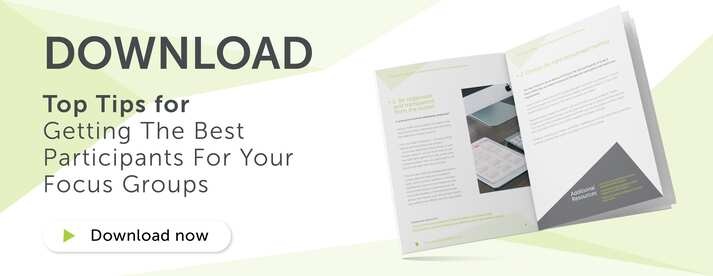
What is a focus group and how can it benefit your market research?
The lowdown on focus groups
Focus groups are one of the most effective and popular market research methods available. Used to gather qualitative data and in-depth insights, they enable researchers to collect information on anything from products and services to beliefs and perceptions in order to reveal true customer attitudes and opinions.
A typical focus group usually involves six to 10 respondents brought together with a trained moderator to take part in a planned discussion. During the focus group, they will be asked a series of predetermined questions to discover their thoughts and feelings about a particular topic, product, or area of interest. All of this results in an open-ended, free-flowing discussion that will then be used to help brands to make informed business decisions.
In this blog, we take a look at the differences between online and traditional focus groups, the benefits of focus groups in qualitative market research, and examples of when they might not be so useful. So if you’re thinking about using a focus group as part of your next market research project, read on to find out more!
Online versus face to face
Traditionally, focus groups take place in person, usually at a facilitated location. However, thanks to advancements in technology, it’s becoming increasingly popular for focus groups to take place online rather than face-to-face. In an online focus group, users login to a secure site where they are interviewed via webcam - but of course, there are pros and cons to both options.
One of the biggest benefits of online focus groups is that there are no geographical restrictions because people don’t have to travel to a specific location to take part. Not only can this take the headache out of organising, but it’s much more cost effective and also allows brands to reach a wider audience. Online methodologies are also a good way to interact with younger audiences, which means they will continue to grow in popularity in the future.
However, one the other hand, one of the biggest benefits of focus groups in a traditional setting is that respondents tend to have a more natural rapport, which encourages a more flowing dialogue. So, online or traditional, what is it that makes focus groups so popular with researchers time and time again?

Build a rapport and unlock in-depth insights
Well firstly, one of the main benefits of focus groups is that they offer an in-depth understanding of the participants. This enables researchers to uncover personal attitudes and beliefs that other market research methods can’t replicate - which, in turn, means more insightful results. Additionally, because of the constant interaction and rapport between respondents, focus groups also encourage better group discussions and increased interaction. Not only does this keep the participants interested and engaged, but it also enables them to really talk and debate, unlocking new insights that would otherwise remain undiscovered.
Take control and steer the discussion
Another benefit of focus groups is that they allow moderators to go with the flow and probe respondents for more in-depth answers when needed. This means moderators can ensure the discussion takes the necessary routes and delivers the best possible results by enabling them to probe deeper into specific topics to uncover hidden issues. Along the same lines, focus groups also allow moderators to keep an eye out for shy or disengaged respondents and nip any problems in the bud by encouraging all participants to come out of their shell, remain excited and engaged and get involved.

Develop ideas with co-creation
Focus groups also allow researchers to utilise co-creation with participants. This collaboration/workshop effect involves the participants in developing ideas and concepts, encouraging them to bounce ideas off each other, which in turn enables businesses to build products and services directly with their customers. They are also a great way to gather specific understandings of products and services as participants can physically touch and feel items. This is incredibly useful when it comes to product packaging or feedback on new product development, as researchers can access first-hand spontaneous reactions from the respondents to reveal what they are really thinking.
Involve the client for more credibility
Finally, another big benefit of focus groups is that they can involve the client. In a focus group setting, the client can be present on the day to observe the focus group. If the focus group is taking place in a specialist viewing facility, they will often be able to watch via a one-way mirror, or if it is taking place online, they can log in to view the discussion live and even talk to the moderator in real time and shape the direction the conversation is heading. All of this has the added benefit of the research having more credibility with the clients.
When focus groups might not be useful
Despite all the positives, focus groups aren’t always the best option for qualitative market research. One of the main weaknesses of focus groups is that, as a qualitative methodology, they use a statistically small sample size population – which means the opinions expressed may not be representative of a population as a whole. However, if researchers do need to access a larger sample size for their research, focus groups can still be used in combination with other quantitative methods. In fact, because the insights of a smaller sample size are often more valuable, it’s not unusual for researchers to conduct qualitative research such as a focus group before undertaking quantitative research, in order to discover key insights prior to putting the information to a wider market to be investigated further.
If you have been asked to carry out a focus group, why not give us a call today? Alternatively, if you want to find out more about the benefits of focus groups as well as how to recruit the best possible participants, download our guide.



-Feb-19-2026-09-59-49-0345-AM.png)










